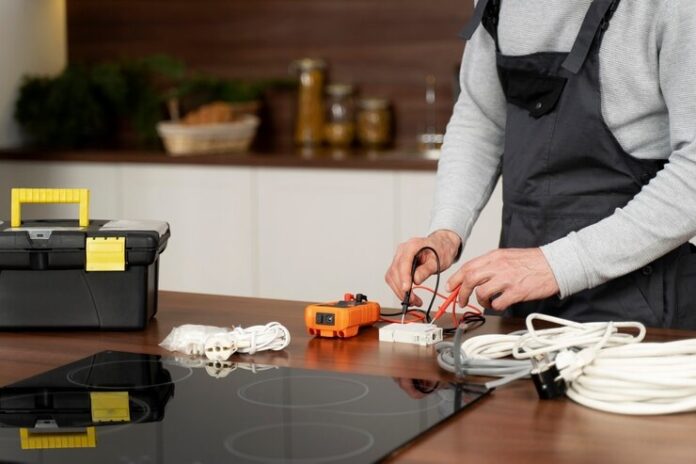Overview:
Ever tried to replace a light switch or ceiling fan on your own? If you’re a DIY enthusiast, you know that sense of accomplishment when you successfully complete a home improvement project. But when it comes to electrical work, things can get a little…well, shocking.
While some electrical repairs may seem straightforward, it’s crucial to understand the limitations of DIY projects and when to call in a licensed professional. Electrical work is no joke – improper handling can lead to serious safety hazards, costly repairs, and even legal issues.
Key Takeaways:
- Understand electrical codes and regulations to ensure safety and compliance.
- Identify electrical tasks you can tackle as a DIYer and those that require professional assistance.
- Learn to recognize electrical hazards and when it’s time to call an electrician.
- Get tips on hiring a qualified and licensed electrician for complex electrical work.
Understanding Electrical Codes and Regulations
Let’s start with the not-so-fun but essential part – electrical codes and regulations. These rules exist for a reason: to keep you and your family safe from potential electrical hazards. Ignoring them can lead to fines, legal liabilities, and even put your home at risk of electrical fires or shocks.
Think of electrical codes as the rulebook for all things electrical. They dictate everything from the type of wiring and materials to use, to the proper installation techniques. And here’s the kicker – even if you’re just tackling a DIY project, you’re still legally required to follow these codes.
That’s why obtaining the necessary permits is crucial, even for seemingly simple tasks like replacing a light fixture. Cutting corners might save you a few bucks upfront, but it’s not worth the potential risks and consequences down the line.
DIY Electrical Repairs You Can Safely Undertake
Now that we’ve covered the importance of playing by the rules, let’s dive into the electrical tasks you can potentially handle as a DIYer. But before you grab your tools, remember: safety should always be your top priority.
- Replacing Light Fixtures and Ceiling Fans
Feeling confident about swapping out that outdated light fixture or noisy ceiling fan? With the right precautions, this is a task many homeowners can tackle themselves. Here’s a quick rundown:
- First things first, turn off the power supply at the circuit breaker or fuse box. Double-check that the power is off by flipping the light switch.
- Follow the manufacturer’s instructions carefully, and use the proper tools and equipment (e.g., wire strippers, electrical tape, etc.).
- Pay close attention to the wiring connections and make sure they’re secure.
Now, let’s table a warning here. If you encounter any issues or feel uncomfortable at any point, don’t hesitate to call a professional. Electrical work is no place for guesswork or risky DIY hacks.
- Installing New Outlets and Switches
Adding a new outlet or replacing an old switch can be a convenient DIY project, but it’s essential to take the necessary precautions. Here’s what you need to keep in mind:
- Again, turn off the power supply and verify that it’s off before starting any work.
- Use the correct tools and materials, including the appropriate wire gauges and connectors.
- Follow the wiring diagrams carefully and ensure all connections are tight and secure.
- If you’re adding a new circuit or working with outdated wiring, it’s best to leave it to the pros.
- Upgrading Electrical Panels (With Proper Knowledge and Precautions)
For the more adventurous DIYers out there, upgrading an electrical panel might seem like a tempting project. However, this task requires a significant level of knowledge, experience, and safety precautions. Here’s what you need to know:
- Familiarize yourself with the local electrical codes and obtain the necessary permits.
- Ensure you have the right tools and equipment, including a voltage tester and proper personal protective equipment (PPE).
- Follow the manufacturer’s instructions to the letter and take your time.
- If you encounter any issues or feel unsure about any step, don’t hesitate to call a licensed electrician.
Remember, electrical panels are the heart of your home’s electrical system, and improper handling can have severe consequences.
Electrical Repairs That Require Professional Assistance
While DIY projects can be rewarding, some electrical tasks are best left to the professionals. Here are a few examples of when you should call in a licensed and experienced electrician:
- Electrical Service Upgrades and Panel Replacements
If your home needs a service upgrade or a complete panel replacement, it’s time to bring in the big guns. These tasks involve intricate wiring, load calculations, and adherence to strict codes and regulations. Attempting these projects without proper training and expertise can be incredibly dangerous.
- Wiring New Construction or Additions
Whether you’re building a new home or adding an extension to your existing property, the electrical wiring is a job for the pros. Improper wiring can lead to safety hazards, code violations, and even potential legal issues down the line.
- Resolving Complex Electrical Issues or Code Violations
If you’re experiencing frequent circuit breaker trips, flickering lights, or other electrical issues that you can’t pinpoint, it’s best to call in an electrician. They have the tools and expertise to diagnose and resolve complex electrical problems safely and effectively. Additionally, if your home has existing code violations, a professional electrician can help bring your electrical system up to code.
Remember, attempting complex electrical repairs without proper training and expertise can put you and your family at risk of electrical shocks, fires, and other hazards. It’s simply not worth the potential consequences.
Identifying Electrical Hazards and When to Call a Professional
Even if you’re not planning any major electrical work, it’s essential to be aware of potential electrical hazards in your home. Here are some common signs that it’s time to call in a professional electrician:
- Flickering Lights or Frequent Circuit Breaker Trips
If you’ve noticed flickering lights or frequent circuit breaker trips, it could be a sign of a more significant electrical issue. Don’t ignore these warnings – they could indicate an overloaded circuit, faulty wiring, or other potential hazards.
- Burning Smells or Discolored Outlets
If you detect a burning smell or notice discolored outlets, it’s a clear indication that something is amiss with your electrical system. These signs could point to overheating, arcing, or other dangerous conditions that require immediate attention from a professional.
- Outdated or Damaged Wiring and Electrical Components
Older homes often have outdated wiring or electrical components that may not meet current safety standards. If you notice exposed or damaged wiring, obsolete electrical boxes, or other signs of aging electrical components, it’s time to call in an electrician for an inspection and potential upgrades.
Remember, electrical hazards are not something to be taken lightly. Ignoring these warning signs can put your home and family at risk. When in doubt, prioritize safety and call a licensed electrician for an evaluation and necessary repairs.
Tips for Hiring a Qualified Electrician
Now that we’ve covered the importance of seeking professional assistance for complex electrical work, let’s discuss how to find and hire a reputable and qualified electrician. Here are some tips to keep in mind:
- Check for Proper Licensing and Insurance
Before hiring an electrician, verify that they are licensed and insured in your area. Licensed electricians have undergone the necessary training and testing to ensure their competency and adherence to electrical codes and regulations. Additionally, proper insurance protects you from potential liabilities in case of accidents or damages.
- Request References and Review Online Reviews
Don’t hesitate to ask for references from previous clients. A reputable electrician should be able to provide you with a list of satisfied customers. Additionally, take the time to read online reviews and ratings to get a sense of the electrician’s reputation and quality of work.
- Obtain Detailed Quotes and Understand the Scope of Work
When obtaining quotes from electricians, ensure that they provide a detailed breakdown of the work to be performed, including the materials and labor costs. This transparency will help you make an informed decision and avoid any potential misunderstandings or hidden fees.
- Communicate Clearly and Ask Questions
Effective communication is key when working with an electrician. Don’t hesitate to ask questions and voice any concerns you may have. A good electrician will take the time to explain the process, address your questions, and ensure that you feel comfortable with the work being performed.
Remember, hiring a qualified and licensed electrician may cost a little more upfront, but it’s an investment in your home’s safety, quality workmanship, and peace of mind.
Conclusion
Remember, hiring a qualified and licensed electrician may cost a little more upfront, but it’s an investment in your home’s safety, quality workmanship, and peace of mind. By understanding the limitations of DIY electrical repairs and knowing when to call in the professionals, you can ensure that your home’s electrical system is safe, compliant, and functioning optimally.
Electrical work is not something to be taken lightly. While some tasks may seem simple enough for a DIYer, it’s crucial to recognize the potential dangers and risks involved. From electrical shocks and fires to costly repairs and legal consequences, the stakes are high when it comes to improper electrical work.
By following the guidelines outlined in this article, you’ll be better equipped to tackle the electrical repairs you can handle safely and know when to leave the more complex tasks to the experts. Remember, your safety and the safety of your loved ones should always be the top priority.
So, the next time you’re tempted to tackle an electrical project on your own, take a step back and assess the situation objectively. If you have any doubts or concerns, don’t hesitate to call in a licensed and qualified electrician. Their expertise and adherence to electrical codes and regulations can provide you with the peace of mind that your home’s electrical system is in good hands.
Embrace the satisfaction of successful DIY projects, but know your limits when it comes to electrical work. With the right balance of DIY enthusiasm and professional assistance, you can maintain a safe and well-functioning electrical system in your home for years to come.










